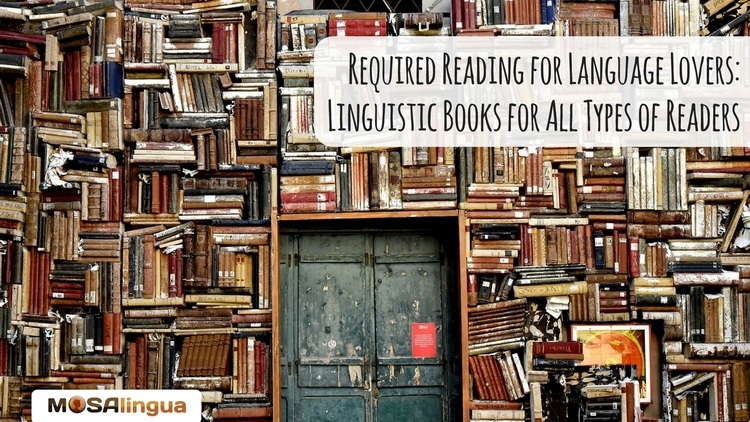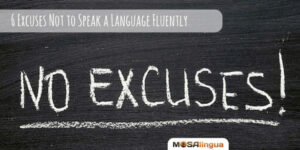Reading is one of language lovers’ biggest pleasures. We read to learn, we read to relax, we read to improve our craft, we read to improve our health, we read to escape, we read for fun… And one this is for sure, all avid readers keep a long “to-read” list. Readers and language lovers alike (though they are generally synonymous!) are sure to find a few books in this post to add to their own list. Share your own favorite linguistic books in the comments section!

Required Reading for Language Lovers: Linguistic Books for All Types of Readers
Tell us what type of reader you are, and we’ll tell you what linguistic books you need to pick up!
For Fiction Fanatics
These are perfect choices for people who love language but don’t want anything resembling the linguistic books that are required reading in school.
Fahrenheit 451, Ray Bradbury
Perhaps Ray Bradbury’s most well-known work, this is a must-read for language lovers and bookworms. It takes place in a dystopian society where firemen don’t put out fires, they start them. They are charged with destroying illegal books and libraries. Tragic, I know. This classic brings up questions about language censorship, the “dangers of an illiterate society,” and the influence mass media can have on a population.
Babel-17, Samuel R. Delaney
Another sci-fi pick, this one focuses on alien messages in an unknown language that must be deciphered to save humanity. As a language lover, I’ve been waiting for a story whose hero is a linguist, and here it is! Bonus: If you liked the book, check out the movie “Arrival” and the short story it was based on for more alien-linguistics fun.
Start learning a new language today

Good news: we can help!
More good news: you can get started for free! Start your free trial now and for the next 15 days, take advantage of the most effective language learning method on the market!
Vocabulary flashcards, videos with subtitles, audiobooks, articles adapted to your level – with MosaLingua Premium (Web & Mobile), you’ll have access to all this and more. Get started right now. It’s free—and risk-free—to try!
For Professional Philologists
These books are for people who are lucky enough to use language to make a living.
Word Freak: Heartbreak, Triumph, Genius, and Obsession in the World of Competitive SCRABBLE Players, Stefan Fatsis
A unique take on language in the workplace, this book takes you behind the scenes of this under-appreciated sport and its superstars. Discover how a love of linguistics can turn into a career, and get tips to improve your own Scrabble strategy.
Found in Translation: How Language Shapes Our Lives and Transforms the World, Nataly Kelly and John Zetzsche
Translations are all around us, whether we notice it or not. This book brings translation into the light, and exposes its importance in our daily lives. Translators build bridges between cultures and ensure mutual understanding, using a passion for language and linguistics. Critics call this “a fun read for translation-industry insiders and language geeks alike.”
For Wandering Wordsmiths
This category is dedicated to travel writing. Settle down with one of these books and take a trip around the world without leaving your favorite armchair.
Time Was Soft There, Jeremy Mercer
Journalist Jeremy Mercer was down on his luck – well, slightly more than down, as he left his home country due to a death threat… He happened upon Shakespeare & Company in Paris, a quirky bookstore that took him, and thousands of other starving writers before him, under its wing. Mercer’s reflections on travel, reading, writing, and life made this one of my favorite reads of the year.
When in French: Love in a Second Language, Lauren Collins
“‘Talking to you in English’, he said, ‘is like touching you with gloves.'” No, not all good travel writers write about French-speaking countries, but I couldn’t leave this book off the list. Collins makes thought-provoking observations about love and what happens when it clashes with language and sociolinguistics.
For Perusing Polyglots
Some people collect languages like others collect refrigerator magnets. Anyone who can switch from Swahili to Danish to Russian in the blink of an eye will appreciate these books.
The Power of Babel: A Natural History of Language, John McWhorter
A true gem for polyglots, this book takes readers on a journey through time. The trip explores the births, deaths, and all of the evolutions in between, of over 6,000 languages. McWhorter succeeded in writing something approachable enough for non-professionals but rich enough for even experienced linguists.
In the Land of Invented Languages: Esperanto Rock Stars, Klingon Poets, Loglan Lovers, and the Mad Dreamers Who Tried to Build a Perfect Language, Arika Okrent
Not all languages are created equal – well, not all languages are created. But this book is dedicated to the ones that are man-made rather than those that evolved over time. Filled with fun (and funny) facts about made-up languages and their creators, this pick might just inspire readers to brush up on their Klingon!
For Articulate Academics
These linguistic books are fascinating reads, but might be slightly more technical than some readers are looking for.
Foundations of Language: Brain, Meaning, Grammar, Evolution, Ray S. Jackendoff
Linguist Stephen Pinker writes, “Few books really deserve the cliche ‘this should be read by every researcher in the field,'” but he believes that this one does. An in-depth look at the four topics listed in the title and more, this is a great pick for people who already have a base knowledge of the subject.
On Language, Noam Chomsky
Famous “linguist, philosopher, cognitive scientist, historian, social critic, and political activist” Noam Chomsky is also an extremely prolific writer. To the tune of over 100 books! This collection combines his passions and presents a fascinating, though somewhat dense, introduction to his theories about, what else? – language.









Comments